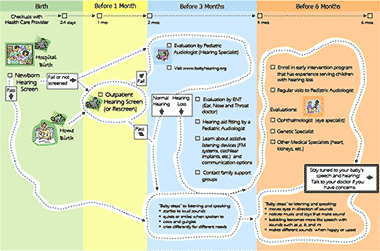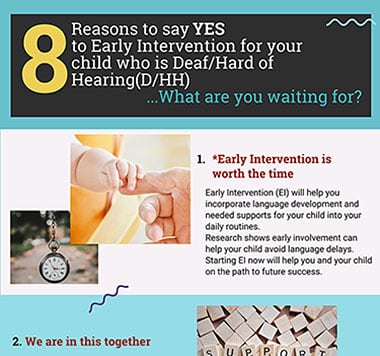When it is confirmed that a baby is deaf or hard of hearing, families begin a new journey with their baby. Most parents are looking for support and information to guide this journey. A ‘roadmap’ for families to follow in the early months of their journey was developed by the National Center for Hearing Assessment and Management (NCHAM). With their permission, we have included a smaller version of the ‘roadmap.’ By clicking on the links below the image, you can find the full versions.

English Version:
https://www.infanthearing.org/documents/parent-roadmap.pdf
Spanish Version:
https://www.infanthearing.org/documents/parent-roadmap-spanish.pdf
- As the roadmap shows, there are several helpful follow up appointments and experiences. These often include:
- A visit to an ear specialist (called an ENT [ear, nose, and throat doctor] or otolaryngologist). An ENT will evaluate your child's medical needs related to hearing and may recommend additional testing. These might include referrals to:
- An eye doctor (Ophthalmologist) to ensure that the child can see well
- A geneticist (to examine the cause of hearing loss)
- Other medical specialists (heart, kidneys) based on the needs of the child
- You also will be making frequent visits to your Audiologist in the months following confirmation. Your Audiologist is an important resource and will support you in
-
The Virtual Waiting Room is a compilation of family-friendly resources on a variety of topics that will be helpful early in your journey. It is a great way to spend a few minutes while waiting for appointments.
Early Intervention
It is important to start
early intervention services as soon as possible. A
family-infant specialist will help connect you with follow up services and other sources of support. Hands and Voices developed a helpful resource that provides 8 reasons to say “yes” to early intervention for your child who is deaf or hard of hearing.” Click on the image below to find this resource.

Spanish:
https://www.handsandvoices.org/fl3/resources/pdfs/SayYestoEI-Spanish.pdf
Family Support
- It can be very helpful for families to talk with other families of children who are deaf or hard of hearing. These families have shared experiences with you. They can support your emotional adjustment and point you to valuable resources. Ask your family-infant specialist, your audiologist and/or your services coordinator to link you with
family-to-family support resources.
- Many families find it helpful
to meet with adults who are deaf or hard of hearing. These individuals have valuable experiences to share about what it means to be deaf or hard of hearing. Ask your audiologist, family-infant specialist, or services coordinator to help you link with adults who are deaf or hard of hearing.